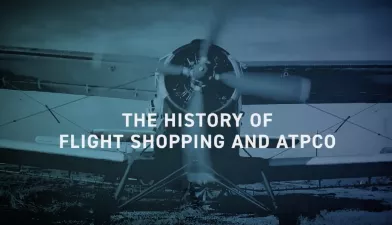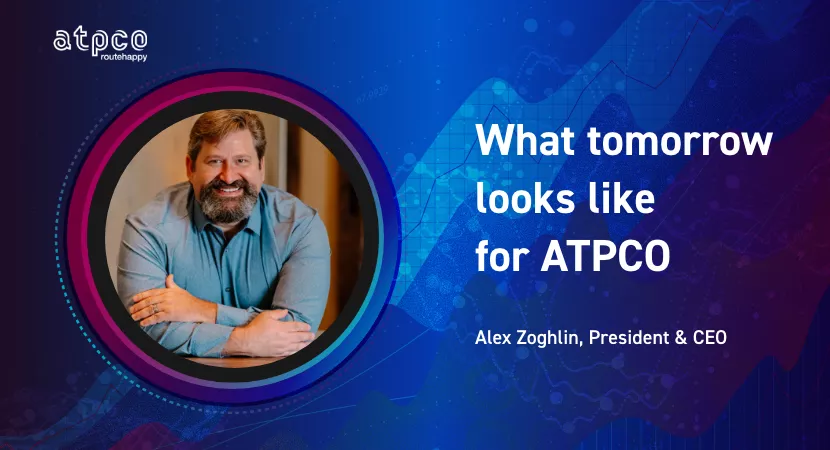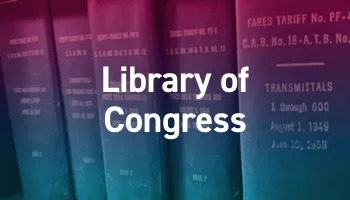On demand | Elevate 2022
Industry insights from Jerry Foran, ATPCO’s Board Chair
KEYNOTE • THOUGHT LEADERSHIP
Kick off the conference with one of the leading experts in the travel industry and ATPCO’s Board of Directors Chair, Jerry Foran.
Jerry: Like Alex said, it’s great that you’re all here. Great that we can all get back together in person. So, over the next two days, you’re going to be hearing lots about the future and what’s going on and how exciting it’s going to be. And it is going to be exciting. It’s going to be challenging, and how we’re all going to work together to achieve all these good things.
So, I'm not going to do any of that.
So, I'm going to talk about the past, and I'm going to link it loosely to, well, not that loosely, actually, to my experience in British Airways, that I've worked in for over 45 years. And during that time, clearly, I've seen a number of changes both in British Airways and in the industry itself.
So my point about it is that I'm trying to say… That it is difficult to understand the future if you don't to some extent at least understand the past. And I would say that because I am the past.
So, 1976, that is the year that I joined British Airways, and not the year I was born, sadly, but the year I joined British Airways. And in that year Concord flew its first commercial flight, and not to New York, because the Americans in the audience, you hadn't invented or you hadn't built a successful supersonic jet, so you wouldn't let it fly into New York. So, we had to go back to Bahrain instead. And eventually Concord did get into New York, but not until the end… I think it was 1977.
And down in the bottom left hand corner about style, I read this and I realized that I had more in common with the women of the time than the men of the time. As I used to, I did used to wear flared trousers, and I did used to wear platform shoes. Fortunately, there are no pictures of this. And certainly not one I'm prepared to share. So, that was 1976 when I joined.
In that year, there was also a heat wave in the UK, and we had temperatures above 30 degrees, 30-35 degrees for almost a month, which is record-breaking and still hasn't been broken today in terms of the length of it. And while I was working for a life insurance company, in the middle of a heat wave, in the city, and that was six months after I left school, my friend sent me this advert saying you need to come and join and work British Airways. I'm getting paid three times what you're paying, I'm doing little or no work and you get free travel. So, I said, “That's the job for me.
So, that's what happened.
As I said, Concord started, I think it flew its first flight about a month before I actually joined and flew to Bahrain, and then later it started to fly to Singapore as well. Beyond Bahrain actually a joint operation with Singapore Airlines. And our Concord actually had Singapore Airlines logo on one side, which was amazing at the time. And like I said, he didn't get back into New York until end of ’77 I think it was.
So, this is a call center. This is the call center, not the one I actually joined. So, going back to the advert. The advert came out I think in 1975, and in 1974, British Airways, sorry, British European Airways, merged with the British Overseas Airways Corporation. So European and Long Haul Services merged into one airline. And we then had two terminals in central London, one at Victoria, which is now the National Audit Office, and the other one which is this one, which is at West London in Cromwell Road, which is now sadly a Sainsbury's superstore. But, we had those two terminals in London because then the London Underground didn't reach the airport. You could not get to Heathrow airport by underground or by train. You had to either be driven there or you had to get the bus. And the buses went from Victoria Air Terminal, West London Air Terminal in the Center of London.
So, this one is a picture of the call center in the West London Air Terminal, which was formerly the BEA terminal and, apparently, I was told many years ago that I'm in this picture. But it's like where's Wally? I've not been able to find myself in this picture at all, although I've tried several times.
Down in the bottom left-hand corner, you can see the man in control monitoring all the calls to make sure we were doing what we were being paid to do. A great job, and when I joined, we rotated.
So, one of the first things I did after telephone sales was to go into a department called “Agents Inquiries.” And Agents Inquiries, their objective, strangely now, was to calculate the cheapest fare. So, travel agents would call up and we'd spend hours trying to work out how to reduce this fare and minimize the amount of money that the airline got. At the time it seemed perfectly rational, and I thought, well, you know, that’s what you do. And actually, I would do it, and then my supervisor would check what I'd done. See if I missed out a more distant point… that should mean something to some of you and nothing to many of you, but all of these. And we do this for hours and hours and hours.
Anyway. That was the joy of working for BIA at that time, which was then a nationalized industry and had not been privatized, so profit really wasn't a big thing. And this is, as I joined on the left-hand side, you've got something called, well, it's either Beacon or Boadicea, but they were the precursors of the thing on the right, which is a videcom set, which is what I actually learned on, but the thing on the left-hand side was like our backup. And I was trained to use that videcom set to create bookings and a booking was a name, an itinerary, a contact number, and that was pretty much it. And you could then end transaction and you could get a PNR.
And you might ask yourself, what has changed? And the answer is nothing. You still have to do exactly the same thing to create a PNR. Now, what you get is thousands of lines of gobbledygook in that booking as well, which no one can understand. So, that the modern day PNR and clearly, it’s time has come, although we’ve been saying it’s time has come, for some time.
So, here on the left you can recognize me, my younger self and my loving wife looking into my eyes. And she doesn't look at me like that way anymore, sadly. But. Although we have been, I hasten to add, happily married for over 40 years. And so, I went to work in our Oxford Street Sale Shop and she went to work in our Regent Street Sale Shop. And that was retailing, yeah?
So that was the way you reach out to customers. We sold them tickets. We sold them holidays. We sold them… not only that, these shops developed into selling baggage and other travel ancillaries. But, obviously, in a different way to the way we're talking about it now, but it was very successful. With our bags, the bags we sold were more profitable than the flights we sold.
And so, retailing was a thing back then, which actually then disappeared when the shops eventually closed down and everything started to go online. Oxford Street, the shop itself got closed down after the IRA decided to set off a bomb at Selfridges, which was right opposite our store. But it took most of the BIA office at the same time. Fortunately, no one was there. It was the middle of the night and then they closed all the all the shops down soon after that. But, it was a great time and it was a great way to learn what was going on.
At this time, in the CRS world, when I was on using videcom and all the rest of it, you had Sabre had introduced their terminals into travel agents, and United has done the same thing and then others followed. But at that time, you could only book the airline that that terminal belonged to. You couldn't book anything else. Gradually then they changed, and Saber or American allowed their terminal to be used to book airlines that were in a non-compete situation. And then it slowly developed and, ultimately, into the GDSs we have today. But it took a very long time to get to that point.
So, ATPCO, it had already existed for a while, many years, and at that time distributed the paper tariff, those lovely manuals, which we still had long after it was being produced electronically. And so, that happened in 1982 and then, ultimately, then the first auto quoting of prices was possible soon after that.
So, after I left the sale shops, I joined… I think it was then called “yield control.” Or it might be called “space control.” Space control or yield control, some silly name and, ultimately, it turned into capacity management, which was the forerunner of revenue management.
And so, I joined the team as I was described as a COBRA analyst. So, you can just see in the back of that screen the words “COBRA,” which stood for Capacity Optimization Bringing Revenue Advantage. And we had to give all our systems a name at that time, which sounded aggressive and dangerous. Not that they were going to do anything good or make any money, but we had to give them an aggressive and dangerous name.
So, we called the first revenue management system “COBRA.” And we won an award for it from the British Computing Society, who didn't really understand it, to be honest. But there I am on the bottom left-hand corner, accepting with my colleagues this award, which is very exciting at the time. So, who knows what that image is on the left, hands up?
Ohh, some of you. Actually not many of you. Blimey, there are a few of us left.
So, that that image on the left is a series of what are called “revalidation stickers.” So, when we had paper tickets, you could put one of these stickers on the ticket and you could change the flight number, the date, the time, everything, and you could stick this on the paper ticket. Staff, in particular, used to be very good at this in changing their own bookings and had their own supply of revalidation stickers, which they kept with them constantly, including me. The stickers were a fantastic way to abuse just about every rule there was in the book from a tariff perspective, but they were very handy for staff travel. You could suddenly invent an interline agreement that didn't exist, and it would just be taken, and you wouldn't worry about what would happen afterwards.
So, electronic tickets were first came into existence in 1994, but it literally took years and years and years before we were able to get rid of paper tickets. And then get rid of MCOs and move to EMDs. It took a very, very long time indeed, and when I was working in Oxford Street Sales Shop, I always remember a guy coming in. And he came to me, and I was at the counter wearing my uniform, and you know, “how can I help you sir?”
He said, “I want my money back.”
So, he had a nonrefundable, non-changeable, can't do anything with this ticket whatsoever.
So, he says, “Are you saying my ticket is completely worthless?"
And I said, “That's exactly what I'm saying. And I'm sorry about that, but that's exactly what I'm saying. Have you heard of travel insurance?”
And he took this ticket, and he tore it up into 1,000 pieces in front of me, and he threw it at me. It's like confetti landed on my head. This ticket in multiple pieces.
And then I said, “Well, okay.”
And he said, "Give me my ticket back.”
And I said, ‘Well that's going to prove to be a bit tricky and I really apologize.”
He said, “So I've lost all my money?”
I said, “I'm afraid you have.”
And we had many occasions, not quite as dramatic as that one, but with the good old paper ticket, but ultimately it was replaced with electronic tickets and British Airways I think was the second largest carrier at the time to ultimately mandate it and say, “This can't go on any longer.” You had two years, and if you're not on e-tickets within two years, we can no longer interline with you. And two years later, we had to cancel the interline agreements with 150 different carriers because they still hadn't gone to e-ticket.
Now, sounds dramatic, but again, those 150 carriers weren't worth a great deal of money to us. They were just a long tail, but it was the only way we could make a statement which enabled the world to move forward. And I think we're coming into a similar situation today.
So, after I'd been in revenue management for a while, I got appointed as commercial manager and got posted to Tokyo for three years, which was absolutely fantastic, one of the best times of my career. But a couple of things happened. Soon after I arrived, on the left there, we had the Syrian gas attack on the underground station. That underground station was right by our office and at the peak travel time. But fortunately, I was actually in Newcastle back in the UK, visiting our call center there. So I missed it.
And then it was closely followed by the Kobe earthquake, which was much more tragic and killed literally thousands of people. But I'll come back to why that's relevant in a sec.
On the right hand side, you've got all of the carriers, with the wonderful tail fins that we had in the mid 90s, which was trying to show you that we were global airline. This went down very well overseas and while I was in Japan… you had queues of people at the airport waiting to see these airplanes arrive so they could take pictures of them.
In the UK, it got the opposite. And the famous picture of Margaret Thatcher, our beloved Prime Minister at the time, at a touring party conference, put a handkerchief over our tailfin to cover it up. And so, globalization really didn't mean… it wasn't of interest to people then, and they certainly weren't interested in seeing anything other than the British flag, which I thought was particularly sad but that's the way it was at that time.
So, we can now automate ticket reissues. Again, with the assistance of ATPCO, who developed the capability and then all the GDSs and the airlines could use it. So this was another huge big step forward, but we're still living in a world of PNR's and tickets. This isn't meant to be an advert for Amadeus, but Amadeus couldn't provide me with a decent slide, so this is what you've got. Sorry, sorry, Corinne. I know she's in the audience somewhere. She sent me pictures, but they weren't worth it, so I just use this one.
So, in the year 2000, we had successfully sold our res system, inventory system, and DC system to many carriers around the world. And I had many fun trips going over the edge, to the Far East, in particular. To Korea, to Japan, to Taiwan and selling our systems under the Speedwing Technologies banner. But in year 2000, we decided to outsource the whole thing and we chose to outsource it to Amadeus. And they then took our inventory and DCS systems, which they didn't have at the time, and they rebuilt them. Copied what we'd done basically, but we built them, made them better and all the rest of it.
So, we were then a fully Amadeus carrier from mid 2000s. And it was a great time… developing the inventory system with Amadeus was, again, another fantastic experience. And a big step forward. And then, skipping forward quite a lot to 2010, and things have really started to move and really take us to where we are now in terms of NDC and ATPCO’s role in it with open access right at the start, and handing the schemer over to IATA at that time.
Now, you can see there dashing looking strange characters, second in from the left, which is me. I didn't want to look like that, but they forced me to and that was our distribution and revenue management teams at the time. As we were trying to work out what to do with NDC.
And it was a time of great excitement and again, it was quite a while ago. And I would still say that not a lot has happened in the interim and it's taken us a very, very long time to move forward on this stuff and there are many reasons for that.
So, now we're in a world where we have less resources and less people. The picture of the two guys there, that's Michael O'Hagan on the left, and Andy Tunnacliffe on the right, with what they like to do most standing right behind them. And they did many other things besides… they're happily retired now, but left us during the pandemic. But they're just an example of all the skills and resources that we have lost, that ATPCO has lost, that the airlines have lost, that suppliers have lost.
We've all lost these resources and we're now struggling to get back to where we want to be and to move forward and start again from where we left off before the pandemic happened. Now, of course we have the war in Ukraine and various other things to worry about as well, but we are badly affected by the lack of resources, both in an operational sense and also in a commercial sense.
So, I want to leave you with two things in conclusion.
First one on the left is me completing the London Marathon. I was a bit fitter then in 1984 and I've taken the time off the top of that slide. So, as I won't embarrass Tom Gregorson. Because you know, clearly, I'm faster than Tom was so… and I don’t want to get into an argument about it.
But, the object of that slide is the saying “it's a marathon, not a sprint.” Well, I think it was a marathon, but we've run the marathon, and we still haven't got to the finishing line. So, I do think that it is definitely time that we need to move forward at pace because if we don't… someone else will do something that we don't like.
And on the right-hand side to finish are my two grandchildren. Two granddaughters. Picture take last week, and just to say in finishing, in nine seconds, eight seconds…. What we do is important, but nothing’s more important than family and friends.
Thank you very much.
An event experience you can't miss
ATPCO's Elevate + ARC's TravelConnect
Speakers

Jerry Foran
Head, Product Delivery, Global Revenue, British Airways
With more than forty years and several management positions within the commercial area, Jerry now leads a three-year program to upgrade BA's revenue management capability to ensure it can take advantage of developments in price and inventory distribution. For three years, Jerry was based in Japan as commercial manager. He has extensive revenue management experience, including project managing BA’s team on the Amadeus Altea Inventory project during its specification stage. He also serves as ATPCO’s chair of the board, member of the ATPCO board Executive and Nominating Committees, chair of the IATA Passenger Tariff Conferences Steering Group, BA's voting representative on the IATA Joint Passenger Services Conference (JPSC), member of IATA's Passenger Distribution Group (PDG) looking at New Distribution Capability (NDC), and member of IATA's PDG Advisory Forum.
You might also like



